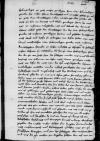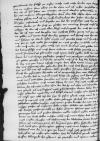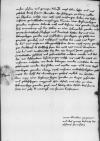List #2514
Anna DUNCKEN & Cistercian convent in Żarnowiec do Ioannes DANTISCUSŻarnowiec, 1546-11-22
Regest polski:
Opatka Anna Duncken i konwent cystersek w Żarnowcu proszą Jana Dantyszka o radę i wsparcie w związku z działaniami biskupa [włocławskiego Andrzeja Zebrzydowskiego], doprowadzającymi ich klasztor do ruiny.
Skarży się, że była zmuszona przez trzy dni gościć biskupa wraz z trzystuosobowym konnym orszakiem w klasztorze. Biskup zażądał wówczas przekazania mu wszystkich przywilejów i dokumentów klasztoru. Opatka odmówiła, powołując się na przywileje, opata w Oliwie [Adriana], Johanna von Werden oraz zarządców ustanowionych przez króla nad klasztorami w Żarnowcu i Oliwie – Johana Brandesa i Jurghena Roßenbarka. Oświadczyła też, że przywileje przechowywane są w mieście [Gdańsk]. Biskup zniszczył wszystkie uzyskane dokumenty, powołując sie na rzekomy nakaz króla, w który jednak opatka nie wierzy, jako że król był zawsze łaskawy dla duchowieństwa, a klasztor prowadzony jest bez zarzutu.
Biskup kazał następnie sporządzić inwentarz całego majątku klasztoru. Zwolnił wszystkich urzędników klasztoru i obsadził urząd starosty, pisarza i pachołka Polakami, z którymi opatka nie jest w stanie się porozumieć, a którzy tylko jedzą, piją i karmią swoje konie czystym owsem, podczas gdy konie klasztorne jedzą sieczkę i otręby. Zabrał także z klasztoru najlepsze konie. Przysłał polskiego kapelana z pachołkiem, których klasztor musi karmić wbrew swej woli i ponad swoje możliwości. Z tych powodów klasztor nie jest w stanie utrzymywać się, jak dotychczas, z jałmużny i zapisów testamentowych mieszczan gdańskich.
Biskup ustanowił także jako zarządcę dóbr klasztornych niezdatnego do tej funkcji Kaspara Munkenbeg. Zabrał też listy dotyczące kościoła w Pucku i granic opactwa, obiecując oddać je przez swego pisarza, nadal jednak ich nie odesłał.
Opatka prosi Dantyszka o napisanie listu do króla z prośbą o ochronę i uwolnienie od tych szykan.
| odebrano Heilsberg (Lidzbark), 1546-12-21 Rękopiśmienne podstawy źródłowe:
| ||||
Tekst + aparat krytyczny + komentarz Zwykły tekst Tekst + komentarz Tekst + aparat krytyczny
Dem hockwyrdygen yn Goth vather und her(e)nn, her(e)nn
Hockwyrdyger yn Goth vather, genedyger herre. Euer hockwyrdygen genoden / ßey unßer ghancz demutthyghes und ynnyghes ghebeth czu vor(an) czu Gothe deme almechthygen neben wunschunghe alles gutthen alle czeyth czu fur an bereyth und bofeln. Genedyger herre.
Dye weyl wyr yn unßerenn anlyghenden noth und bedrock bey ne superinscribed⌈ee superinscribed⌉ymants a(n)tthers nehest Gothe dem almechthygen, dan bey Euer hockwyrdygen genoden als unßerem genedygem herenn und gelybthen lantheßman rath, throst und hylffe czu yrlanghen vor hoffen, haben wyr nyth kunne(n) untherlosßen, Euer hockwyrdygen genoden myth unßerenn demutthyghem schreyben yn hocher andechthe czu beßuchen, / un(d) superinscribed⌈un(d)un(d) superinscribed⌉ / dy ßylfthyge(n) unßere boeßwer czu enththecken, als dye czu Euer hockwyrdygen ghenoden der czu vor ßycht ßeyn, / dye ßelthygen warden uns arme(n) bdrockte(n), itczunth von eyderman vor losßen, myth Euerm genedygen rathe nyth vor losßen, dae myth wyr / dye hye noch folghenden boßwere enthleddyghet moechthen warden.
Erstlych genedygher her, wye nhu
Czum anderen, / wye / wyernhu ghemelthe czeyth / byschoflyche wyrde myth ßeynem geßynde und pfherden noch noth trofft aus gehalden, / yst her uns annredthen ghewe superinscribed⌈ee superinscribed⌉ßen, das wyr ym alle unßer pryfyleya und schryfthen, dy uns von konye ctzu konye, och von bobestlycher heylykeyth und harczogen ßampth anderer oberykeyt gegeben, / dae mytthe unßer closther ffor langhen jaren fundye reth confurmyrth und bestethygyth, / ßulthen wyr ym czu furscheyn brenghen und ym dye ßelthygen ober anthworthen, und uns doe czu unther ym begeben ßolthen. Dar uff wyr ym  BCz 1599, p. 80 geanthworth, das ßulchs yn unßer macht nyth wehr, ßunder wyr beryffen uns an unßern ms. nr(!)
⌈rnrn ms. nr(!)
⌉ hern
BCz 1599, p. 80 geanthworth, das ßulchs yn unßer macht nyth wehr, ßunder wyr beryffen uns an unßern ms. nr(!)
⌈rnrn ms. nr(!)
⌉ hern
Dor nach hoth ßeyne genode alles fye und als was uff unßerem hoefe geweßenn, das czum closter gehuerth, durch den geßatczthen schreyber, ab es propperlyc superinscribed⌈cc superinscribed⌉kg ßeyn wer, beschreybe losße(n).
Czum fyrden hoth er uns all ampth leuthe abe geßatcz und ßeynes gefaller myth eyne(m) polenschen starasten und eynem polnschen schreyber ßampth dry(n) palnschen knechten unße ampth beßatcz, doe wyr doch nyth mytthe reden ku(n)nen, dye och nyth anders thun, dan das ßy wol esßen und thrynken und yre pferde wol aus futthere(n) myth gelautherthem clarem haber, dar wyr unßer pfherden myth kley und hakßel futtere(n) musßen.
Czum ßepthe ßeyn genod wegk czyn wol superinscribed⌈ll superinscribed⌉th, lyß her fyr dy pesten pferde wegk neme(n), dy ym were(n), dy wyrnoch nyth wydder haben gekryget. Och hoth her uns eyne(n) ungeschyckten polschen capflan myth eynem großen knechte, das wyr ytcz ßyben mußger perßon uff unßerem habe musßen halthen czu czeythen czum tysch ylff dreczen perßon czu tysch yn dysßer ßweren theuren czeyt nyth myth gerynger kost und großem schathen wydder unßere(n) wyllen, entlych czu unßerem vor darbe halden musßen, welch unße arme closter doch alle czeyt myth mylden almysßen und thestamenth der lobelychen staeth Dantczke enthalten yst, mus ytcz gancz czu dro(m)mere(n) geen.
Czu written over Tho⌈ThoCzuCzu written over Tho⌉m ßybenden hoth her uns eyne(n) czum habemester geßatcz myth nome
Czum achthen hoth des bysscoffes genode ethczlyche bryffen belangende dye pfharre czu  BCz 1599, p. 81 unßer py superinscribed⌈yy superinscribed⌉rfen und grenczen belan(en)de wegk holen losßen, und uns gelobeth dorch ßeynen schreyber dye ßelthygen yn kurcz wydder czu schycken, welche wyr noch nyth entfangen haben.
BCz 1599, p. 81 unßer py superinscribed⌈yy superinscribed⌉rfen und grenczen belan(en)de wegk holen losßen, und uns gelobeth dorch ßeynen schreyber dye ßelthygen yn kurcz wydder czu schycken, welche wyr noch nyth entfangen haben.
Aus dysßen unßeren grunthlychen anczeungen kunnen Euer hogkwyrdygen genoden unßeren bedrock, noth und beßwer aus genoden leychtlych ermarkent. Yst der halben an Euer hokwyrdyk genoden unser gantcz frunthlych fleyßyge und demuttyk bytthen, das uns Euer hokwyrdygen genoden aus crystlychem genedygen czu gethonem gemuthe genedyk und erscheyne(n) wylleth, dae myth uns kegen dy ko(niglich)e ma(ieste)t unßerem aldergenedyk superinscribed⌈kk superinscribed⌉gesten heren myth eyner genedygen forschryft be hulflyckg ßeyn, dae myth wyr arme(n) juncferen aus ko(niglich)e ma(iest)et aucthorythet bey den vor langne(n) joren gegeben freyheythen geschüth und gehanthabeth moe superinscribed⌈ee superinscribed⌉chten warden, und das dye vor beschrybene boßweryngen, welche uns myth der czeyth czu unßerem entlychen vor darbe belangen warden, moechthen doe van ghefreyeth warden. Das ßullen und wyllen wyr um(m)b Euer hogk wyrdygen genoden alweg myth unßrem andechthychghem gebet myth der hylff des almechtygen Gothys wyllyk vor schulden, dem wyr Euer hogkwyrdygen genoden yn langer geßunthet und gelokßelygem regyme(n)t thun befeln, uns aber yn Euer hokwyrdyge genoden gonst und schutcz thun befeln.
Dat(um)



